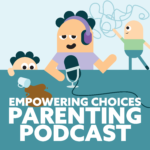Ep. 100 – Let’s Take A Drive And Hash It Out!

In the latest episode of the “Empowering Choices Parenting Podcast” titled “Ep. 100 – Let’s Take A Drive And Hash It Out!,” hosts Joshua and Lucas explore the complexities of having meaningful conversations with children while driving. The episode kicks off with a discussion about a video by Taylor Heaton, a mom with autism, who shares tips on handling difficult conversations during activities like driving or walking. Taylor suggests that these activities, due to their monotonous nature, can facilitate less confrontational discussions because they don’t require direct eye contact, which might ease the pressure on both parties.
However, the hosts express some reservations about this approach. Eric, another speaker on the podcast, points out potential safety concerns and the emotional intensity that can arise during such conversations, especially in a confined space like a car. He emphasizes that while the setting might prevent direct confrontation, it could also trap a child in an intense discussion without an easy way to exit the situation. This, he suggests, could lead to avoidance behavior, where children might dread car rides if they consistently become settings for serious talks.
The discussion then shifts towards alternative methods that might better suit sensitive conversations. Eric and Lucas debate the effectiveness of different environments like walking, eating out, or engaging in a shared activity like playing sports. These activities, they suggest, might provide the necessary distraction or neutral ground needed for more productive discussions. The podcast highlights the importance of adapting to each child’s unique preferences and comfort levels to facilitate open and effective communication.
Further into the episode, the hosts delve into the psychological aspects of why certain settings might work better for some children than others. They discuss how activities that involve bilateral movement, such as playing catch or walking, can help engage different parts of the brain, potentially making it easier for kids to process and discuss their feelings and thoughts.
Wrapping up, the episode encourages parents to be observant and flexible in their approaches to discussing difficult topics with their children. The hosts remind listeners that knowing their child’s individual needs and reactions is crucial in choosing the right time and place for these conversations. They also suggest using these strategies as tools to strengthen the parent-child relationship rather than as a means to control or direct the child’s behavior. The episode concludes with an invitation for listeners to share their experiences and tips on navigating complex conversations with their children, reinforcing the podcast’s community-driven approach to parenting challenges.

Responses